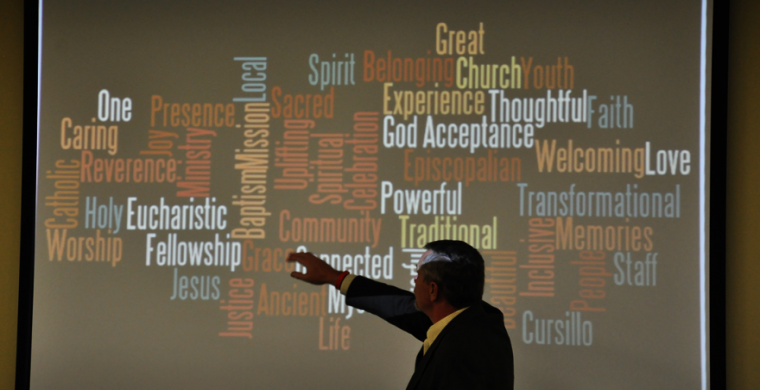Episcopal Church Should Devolve into Unicameral Body, says Report
Enhanced powers sought for Presiding Bishop
Parishes no longer financially self-sufficient. Many disconnected from neighbors with expensive buildings. Ordained face debt mountain, inclusive church has failed to address pressing issues
By David W. Virtue DD
www.virtueonline.org
December 16, 2014
A resolution to be presented at the next General Convention of the Episcopal Church would convert the current bicameral legislative body (House of Deputies, House of Bishops) to a unicameral body to promote shared discussion and consensus building according to a report from the National Church.
Members of the Task Force for Reimagining the Episcopal Church (TREC) presented its final 73-page report, which says that the Church’s structures and governance processes have not yet responded to the profound changes occurring across the country and around the world.
“We see this in our inability to deal with very real and pressing issues: many of our parishes are no longer financially self-sufficient and cannot afford full-time stipended clergy. Many of our churches are disconnected from the neighbors who surround them, with expensive buildings that consume too many resources to maintain. Young people called to ordained ministry face a mountain of debt at the end of their seminary training that they may not be able to repay. While our Church structures and governance have offered a platform for public witness and have helped to create a more inclusive Church committed to practicing and advocating for justice in the world, they have been less effective at addressing other pressing issues.”
The Task Force said the Church had not demonstrated a capacity at the Church-wide level to focus keenly on priorities and to align them with the human, financial, and structural resources to address them.
The Task Force recommended three voting orders in the General Convention: Lay, Clerical, and Bishops. For many resolutions, the three Orders would vote together. All three orders would elect the Presiding Bishop.
■ The Lay and Clergy Orders would elect one of their Deputies as the Presiding Deputy. The Presiding Deputy would receive a stipend in order to enable a greater number of lay and clergy persons to serve as viable candidates for this position.
■ The Presiding Bishop and the Presiding Deputy (PD) would alternate presiding at sessions of General Convention.
■ Retired bishops would no longer have a vote in the current House of Bishops or in the new unicameral body.
■ Meetings of bishops between General Conventions would be called convocations of bishops, since there would no longer be two legislative houses of the General Convention.
■ The General Convention would evolve to become a Church-wide mission convocation.
TREC recommended that the Executive Council should be reduced from 42 to 21.
TREC recommended eliminating all Standing Commissions except the Standing Commissions on Liturgy and Music, and Constitution and Canons and rename the Standing Commission on Liturgy and Music “Theology, Liturgy, and Music”.
ENHANCED POWERS FOR PRESIDING BISHOP
TREC recommended that the Presiding Bishop’s office would have the central responsibility for directing Church-wide staff, have greater accountability at all levels of the Church-wide organization. One of the roles of the Presiding Bishop as “chief executive” of the Church would be to set an explicit, overarching vision and strategy for the Church and for directing Church-wide resources effectively, efficiently, and narrowly in pursuit of this strategy.
The Presiding Bishop’s office would be accountable to the Executive Council for performance review in this specific aspect of the Presiding Bishop and her or his staff’s roles.
The Executive Council would be accountable for progress and outcomes to the broader General Convention. Church-wide mission staff would be measured and evaluated on specific objectives associated with specific priorities set and agreed to by the Executive Council.
By empowering the Presiding Bishop and the Executive Council as an effective executive function and governing Board, TREC believes the Church will be able to reach decisions efficiently and effectively.
TREC believes the Church relies too often on ad hoc task forces of volunteers to address serious and complex issues and has recommended shifting the responsibility for studying critical issues defined by the General Convention to the Presiding Bishop’s office, which would have the flexibility to hire expert staff for specific challenges and projects.
“We would expect the Presiding Bishop’s office, under the governance of the Executive Council, to form advisory boards of world-class experts to inform the work of the staff.”
TREC said there needed to be more responsiveness to local needs and local mission in the use of collective resources. They concluded that most of the important mission work of the Church happens at a local level, with some exceptions, such as public advocacy around important social justice issues.
“We believe that Church-wide mission staff spend too much time ‘marketing’ their services and capabilities to dioceses, many of which also have diocesan services covering the same areas. A centrally coordinated staff would be able to focus resources more keenly to where they are needed most.
The report also recommended that the Executive Council should study the issue of clergy compensation; and the Trustees of the Church Pension Fund should study the following and report to the 79th General Convention on the current pension offerings and how well they serve the Church including those who are providing non-stipendiary service to The Episcopal Church. They said compensation models and pension benefits may not be adequate or may be just in certain areas of the Church, particularly in dioceses outside the U.S.
TREC revealed that it had consulted between 1,500 and 2,000 Episcopalians including bishops, priests and deacons, vestries, seminary students, deans and faculties, and dioceses and parishes meeting together.
The Episcopal Church’s 78th General Convention, June 25-July 3, 2015, will be held at the Salt Palace Convention Center in Salt Lake City, Utah.
One former Episcopal bishop noted upon reading the report, “TEC is as clueless as ever, they will never think of reimagining themselves around the Lordship of Christ and the authority of Scripture.”
END














